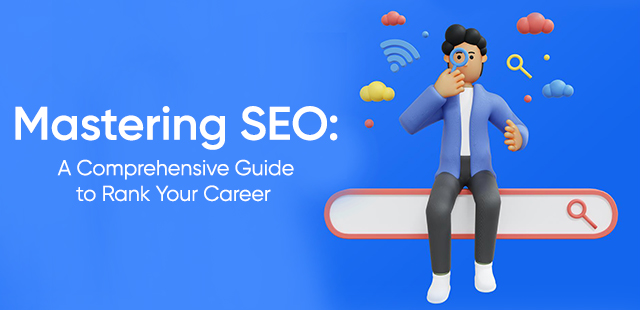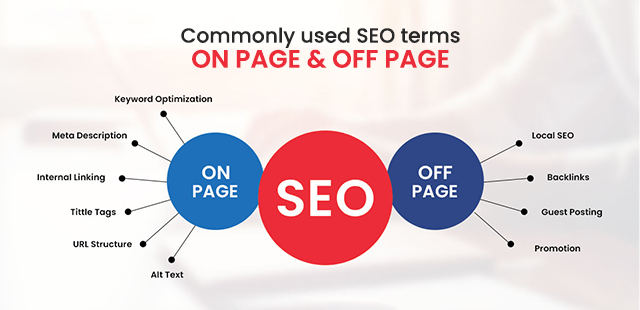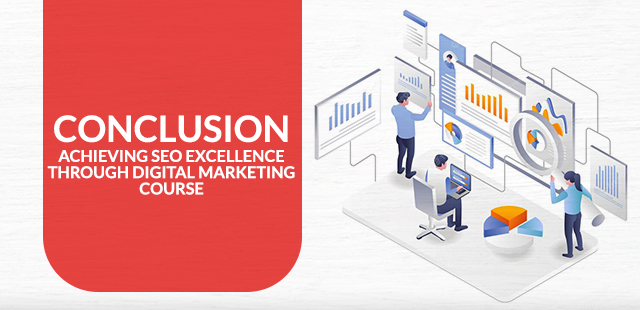Blog > Mastering SEO: A Comprehensive Guide to Rank Your Career
Mastering SEO: A Comprehensive Guide to Rank Your Career
May 9th, 2023

Let us suppose you moved into a new flat and decided to invite your friends to a housewarming party. However, your friends weren’t able to locate your home.Wouldn’t that put a damper to your plans?
Brands face the same challenge when their potential audience isn’t unable to locate them, despite their best marketing efforts.
Enter SEO, aka Search Engine Optimization.
In this comprehensive guide, we'll take you through everything you need to know about SEO best practices usually recommended by the best Digital Marketing courses, and how including these can take your website to the next level. So, buckle up, and let's get started.
What is SEO: Why Is It Important for Your Career?

Imagine spending hours crafting a blog post or creating a stunning website, only to find that it's buried deep in the search engine results pages (SERPs). Isn't it frustrating?
You may have hired a website developer but the website is not properly optimised according to SEO norms. Hence, without the link or the name, no visitors can view your website. That's why SEO matters.
SEO or Search Engine Optimization is a set of practices to optimise your content with the goal of increasing your online visibility, attracting more visitors to your website, and ranking your page on SERP.
Whether you're a blogger, a business owner, or a digital marketer, mastering SEO is essential to stand out in today's online world. But SEO isn’t important only for businesses.
As an SEO practitioner, you have an opportunity to earn as much as 15 LPA, provided you take the right Digital marketing course with placement training. Moreover, SEO is a constantly evolving field, and by staying up-to-date with the latest trends and best practices, you can maintain a competitive edge in your industry.
Now that you understand why SEO is important, let's dive into some practical tips for mastering SEO.
Keyword Research and Analysis

The most important aspect of SEO is keywords. Keywords are phrases that website visitors enter in the search engine (like Google, Bing) to find your website.
In SEO, keyword research is a crucial process of identifying keywords that are relevant to your business and target audience. The goal of keyword research is to find the "right" keywords that will drive significant traffic to your website, while also having relatively low competition with other brands. Deep research in choosing keywords and rightly placing it can increase the relevancy, authority, and search volume of the content.
| Pro-tip: You can also use several tools for your keyword research such as Google Keyword Planner, SEMrush, or Ahrefs. |
These tools will give you insights into the search volume, competition, and difficulty of different keywords, allowing you to choose the most relevant and valuable ones for your business.
Commonly used SEO terms - On Page & Off Page

On-page SEO refers to any activity on your website that directly improves the page to higher its ranking. It includes optimising your content, HTML source code, and website structure. It includes Page crawling and indexing which are activities that enable search engines to discover and analyse your web content. More on this will be covered in the next Digital Marketing blog.
Here are some factors that impact On-Page SEO:
- Title Tag: The title tag is a critical on-page SEO factor consisting of around 55 characters that should accurately describe the content of the page and include relevant keywords.
- Meta Description: The meta description is a short summary of the page's content that appears in search engine results pages. It should be around 155 characters and provide a compelling reason for users to click on the link.
- Header Tags: Header tags structure the content of a web page and make it easier for search engines to understand the main topics and subtopics covered with rightly placed keywords.
- Content Quality: The quality of the content on the page can make or break your SEO efforts. It should be relevant, original within 4% of plagiarism, useful, and engaging for the user, and provide comprehensive coverage of the topic.
- Image Optimisation: Images should be optimised for size and quality, and include alt text that describes the image and includes relevant keywords.
- Keyword Usage: Using relevant keywords and phrases throughout the content, URL, meta tags, and image alt tags can help search engines understand the topic of the page. However, it's important to avoid overusing keywords, as this can negatively impact the page's ranking.
- Internal Linking: Internal linking helps search engines understand the relationships between pages on a website and improves the user experience by making it easier to navigate.
- Site Speed: Site speed is a critical on-page SEO factor that can impact both user experience and search engine rankings. Your website should open within 2 seconds to reduce the bounce rate.
- Mobile Responsiveness: With more users accessing the internet on mobile devices, mobile responsiveness is an essential on-page SEO factor. Your website should feel as user friendly on phone screen as on laptop or desktop screen.
Now let’s come to Off-page optimization.
Off-page SEO refers to the plan of action to boost your content on other websites across the web. The goal is to get other sites to mention your website and increase the number of links to your website on the web.
Here are some important factors which impact Off-page SEO:
- Backlinks: Backlinks, also called “incoming links”, “inbound links,” or “one way links”, are links from one website to a page on another website through an anchor text. The page that contains the backlink to your website should have relevance, quality, and authority for search engines to vote for it.
- Social Media: When you're posting on social media, include relevant information and keywords in captions, alt-text, subtitles, and closed captions of every post. This is a great way to direct traffic to your website through social media.
- Online Directories: Listing your website in online directories, such as Yelp or Google My Business, can help increase the visibility of your website in local search results and improve your website's authority.
- Guest Blogging: Guest blogging involves writing and publishing articles on other websites which can help you establish yourself as an authority in your industry and earn backlinks to your website.
- Brand Mentions: Even if a website doesn't link back to your website through URL, a mention of your brand can still have a positive impact on off-page SEO.
- Social Bookmarking: Social bookmarking involves submitting your content to social bookmarking websites like Reddit, Pinterest,Tumblr, etc. which can help increase the visibility of your content and potentially lead to more backlinks.
Having a solid understanding of on-page and off-page optimisation techniques through a Digital Marketing course is essential for anyone looking to build a successful career in the Digital Marketing field.
Technical SEO: Site Structure, URL Structure, and Sitemaps

Technical SEO is the cornerstone of a high ranking website. A website with technical issues can lead to poor search engine rankings, low traffic, and a poor user experience.
Technical SEO involves:
- Site Structure: The site structure refers to the way a website's pages are organised and linked to one another. A well-organised site structure is essential for both search engines and users, as it makes it easier for them to navigate and understand the website's content.
- URL Structure: URLs should be short, descriptive, and easy to read for both search engines and users. URLs that are too long, contain unnecessary parameters, or use dynamic variables can be challenging for search engines to crawl and index.
- Sitemaps: Sitemaps are essential for search engines as they make it easier for them to crawl and index a website's pages. A sitemap should be submitted to search engines to ensure that all pages are properly indexed.
A well-optimised website is necessary to provide a better user experience, leading to increased engagement, lower bounce rates, and higher user satisfaction.
SEO Professional Career in India & Salary

SEO is a growing field in India, with many opportunities for professionals to build their career. With the right Digital marketing courses, SEO professionals in India can earn an average salary of 3.5 LPA per year, with senior professionals earning up to 15 LPA per year.
To build a career in SEO, it's essential to have a strong understanding of digital marketing and SEO best practices. Pursuing a digital marketing course can help you develop the skills and knowledge you need to excel in this field.
Conclusion

Mastering SEO is an essential skill for anyone looking to establish a successful career in digital marketing. If you want to build a successful career in SEO, you should go for the upGrad Campus digital marketing course with placement training. One of the most comprehensive Digital Marketing courses, this program covers all aspects of SEO and equips you with the skills and knowledge needed to succeed in the digital marketing industry.
Disclaimer: The success of job placement / interview opportunity depends on various factors including but not limited to the individual's qualifications, experience, and efforts in seeking employment. Our organization makes no guarantees or representations regarding the level or timing of job placement / interview opportunity. Relevant terms and conditions will apply for any guarantee provided by upGrad.






Add a Comment